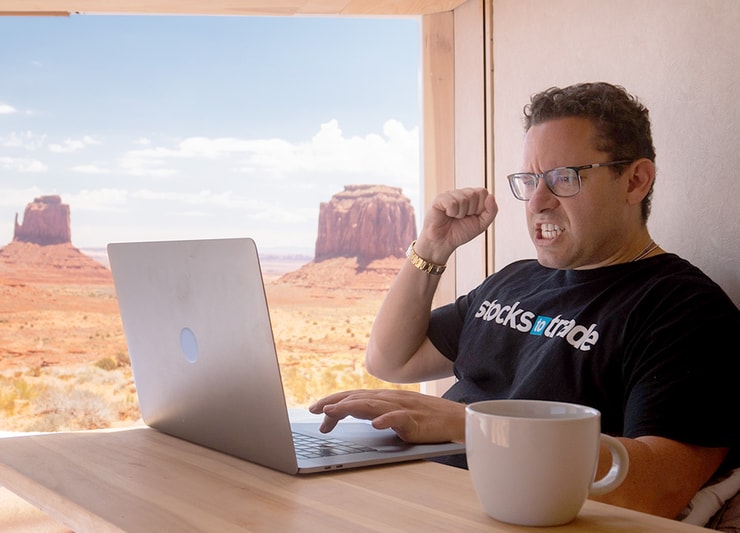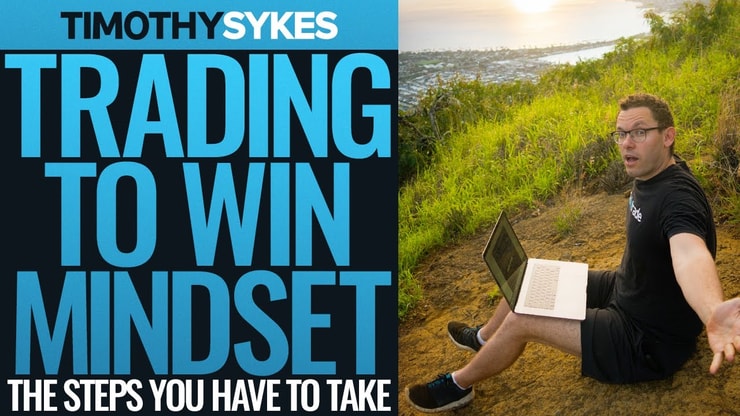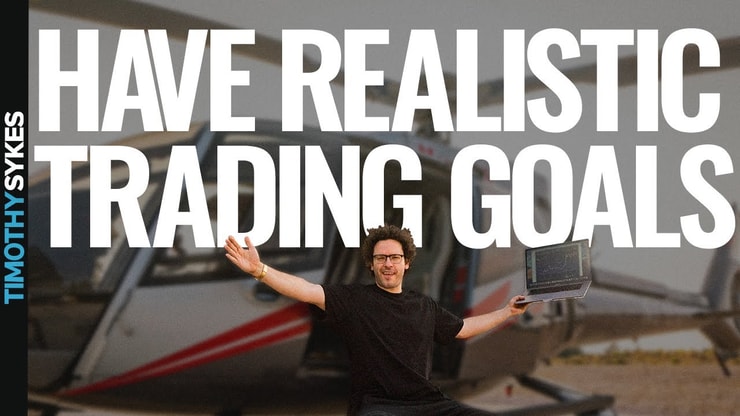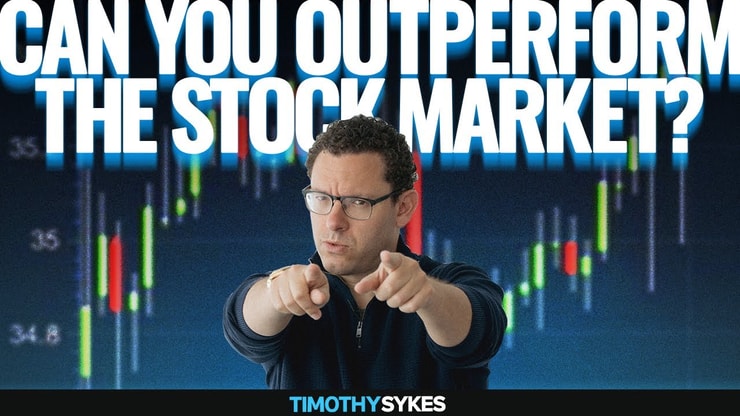Trading psychology might sound like a made-up term, but it’s a very real thing. The stock market may not have emotions, but you, as a person, do. And it’s key to understand that emotions can have a very real impact on how the market — and individual stocks — move.
If you want a long-term career as a trader, you need to learn to stay calm during trades and avoid emotional mistakes.
So how do you keep your emotions in check so that you can better approach trades? You need to cultivate the right mindset.
In this post, I’ll get into trading psychology and risk management, give you some must-read trading psychology books, and offer tips for mentally preparing yourself for trading with a level head.
I’ll answer the following questions:
- What is trading psychology?
- Why is understanding trading psychology important for traders?
- How can trading psychology impact decision-making in the stock market?
- What are the common emotional pitfalls in trading and how to avoid them?
- How does personality type influence trading behavior?
- What are actionable exercises to improve trading psychology?
- How can risk management strategies aid in controlling trading psychology?
- What are some recommended trading psychology books for traders?
Let’s do this!
Table of Contents
- 1 What’s Trading Psychology?
- 2 The Importance of Trading Psychology
- 3 Understanding Trading Psychology
- 4 Trading Psychology and Personality Types
- 5 How to Improve Your Trading Psychology — Actionable Exercises That Work
- 5.1 1. Get Yourself in the Right Mindset
- 5.2 2. Have a Great Base of Knowledge
- 5.3 3. Imagine Winning
- 5.4 4. Imagine Losing
- 5.5 5. Remind Yourself That It’s Real Money
- 5.6 6. Observe the Habits of Successful Traders
- 5.7 7. Practice, Practice, Practice
- 5.8 8. Observe Your Progress Over Time
- 5.9 9. The Power Of The Subconscious And Hypnosis
- 6 Controlling Your Trading Psychology After Losses
- 7 3 Trading Psychology Books Every Trader Should Read
- 8 Trading Psychology Mistakes and How to Avoid Them
- 9 Conclusion on Trading Psychology
- 10 Frequently Asked Questions
What’s Trading Psychology?

Let’s look at the parts of the term separately: trading and psychology. You already know what trading is, but what does psychology actually mean?
Merriam-Webster defines psychology as “the study of mind and behavior in relation to a particular field of knowledge or activity.”
So trading psychology is your emotions in regard to trading.
So many losses and bad trading decisions stem from traders getting emotional and losing their better judgment. That’s when they make stupid decisions, forget every trading rule, and neglect to follow their trading plans.
Unfortunately, when you abandon your trading plan and basics like cutting losses quickly, things usually don’t go well.
As a trader, you have to work hard to cultivate a mindset where your emotions don’t get the best of you. That’s what trading psychology is all about.
Reducing Errors in Judgment and Impulsive Actions
Why is trading psychology so important? And why is it worth spending time to develop and refine it in your trading career?
Improving your trading mindset and discipline can help you avoid brash errors in judgment and impulsive actions.
For one, considering your own reactions during trades can clue you in on triggers that prompt you to make bad decisions. Once you identify those behaviors and what causes them, you can take steps to change them.
Then you can develop a stronger sense of steadiness while trading.
The Importance of Trading Psychology
Trading is about knowing patterns and strategies you can take advantage of for potential profits. But if you can’t manage your emotions when you’re in a trade, you’ll struggle to find consistency.
You have to be able to ignore the emotions tied to losing money and being wrong. Accept that those factors will always be a part of trading.
Understanding Trading Psychology

Managing Emotions
Trading psychology is the reason people say things like, “The market never changes because people never change,” or “The market is run by fear and greed.”
It all has to do with human emotion.
It’s also why I say trading isn’t an exact science. It’s based on people’s emotional decisions to buy and sell. It doesn’t always make sense…
Think about how you emotionally respond while in a trade. You may notice a trend whenever you begin to lose money. Maybe instead of cutting losses quickly, you panic and rationalize holding the position longer, hoping things will turn around.
Check that behavior. In penny stocks, it rarely works out. Usually, you end up losing a lot more. So ditch that ‘hold and hope’ mentality.
When you understand your personal tendencies and emotional reactions in trades, you’re able to identify shortcomings that are holding you back.
And understand how the majority of traders approach trading to help you find an edge. Find out where the emotional people are buying and selling — then trade smarter.
More Breaking News
- Spotify’s Financial Surge: Poised for Growth Amid Upgrades and Strategic Moves
- Microbot Medical Eyes Expansion with Key Milestones in 2026
- Strategic Moves Propel CCH Holdings: Stock Soars
- Itau Unibanco Announces Q4 Earnings as Investor Interest Grows
Implementing Risk Management
When you’re trading, you’re putting real money on the line to try to make a percentage back. If the trade doesn’t work, you’ll lose some money and maybe hurt your ego. You have to learn to get over it.
Losses can sting less when you have a proper risk management strategy.
Whether it’s a max dollar loss per trade, a support level on the chart, or a percentage of your account you risk on each trade — it doesn’t matter. Have a plan and stick to it.
Even if you have a great thesis and entry, and you follow your plan, sometimes trades just don’t work. Learn to let it go and move on.
Trading Psychology and Personality Types

There are definitely some personality traits and ways of thinking that might help or hinder you when it comes to trading. But I’m not a psychologist…
Van K. Tharp has a Ph.D. in psychology. After a few losses in the market, he wondered how much personality type has to do with success or failure as a trader. He developed a test and came up with 15 personality types of traders. The test has a whopping 176 questions … But you can take a quick version of the test here.
From my experience, there are two major personality types…
Rigid
These traders want the market to be an exact science. Everything has to be black and white. A stock’s a buy or not.
They tend to follow patterns, rules, and trading plans strictly. That’s good. But it can come back and bite traders if a stock doesn’t reach their profit goals and they’re too stubborn to adjust their plans…
Flexible
People with a flexible mindset have rules and setups as well, but they may be more flexible about changing their plans and adapting when in the middle of a trade.
It’s good to be flexible, as long as you’re not undisciplined. You can adjust your trading plan when in a trade. But don’t neglect to cut losses or let a winner turn into a loser because you want to give the trade ‘more time.’
The best traders can find the right balance. You have to learn when to stick to the plan and when to be flexible and adapt. That’ll come more with more experience in the markets.
How to Improve Your Trading Psychology — Actionable Exercises That Work

Ideally, you trade as if you were a computer: based on facts and data and without any shred of emotion.
As much as you can aspire to that, the fact is you’re human. You’ll never totally be able to shut off emotions in trading. But you can take steps to improve your reactions so that your suffering can be minimal.
One of the most effective ways to improve your trading psychology is by keeping a detailed trading journal. This journal allows you to track your trades, reflect on your decisions, and learn from both successes and mistakes. It’s a powerful tool for self-analysis, helping you identify patterns in your trading behavior and areas for improvement. An organized and systematic approach to journaling can significantly enhance your trading discipline and decision-making. For traders seeking to refine their trading psychology through meticulous record-keeping, consider using Timothy Sykes’ Trading Journal Excel template to track and analyze your trading journey.
As for the other ways, read on…
1. Get Yourself in the Right Mindset
As a trader, you can benefit from daily pep talks and self-motivation exercises.
Simply reminding yourself of things like stock prices aren’t personal can be powerful.
Another effective way to get in a positive trading mindset is to give yourself the gift of time.
If you constantly wake up late and scramble to study and prepare before the trading day begins, you’re more likely to approach trading in a flustered and rushed state of mind. It’s much harder to maintain a level head like this.
Try waking up a little earlier so that you have time to acclimate to the day. It may help to set up a morning routine. Maybe work out or meditate before you start your research. Do whatever helps you approach trades from a calmer state of mind.
Take a few moments to get focused and in the right headspace before you start trading. You might not totally be able to remove emotions from the equation, but being in the right frame of mind can help pivot when you find yourself making irrational decisions.
2. Have a Great Base of Knowledge
Having a strong base of knowledge about how trading works will set you up to make better decisions, both long term and on the fly.
Knowing key technical analysis techniques and how day trading works can help you navigate the trading day more calmly. Many curveballs will come your way throughout the course of a trade. Your job is to react using knowledge, not emotion.
Think about it this way: You’d never take on a huge home repair without educating yourself about what’s involved and all the things that could go wrong. You’d want to be prepared for all outcomes, and that requires knowledge and research.
It’s the same with trading. Educating yourself can help you minimize risk and make smarter decisions.
One of my goals with my Trading Challenge is to help new traders create a strong knowledge base that’s applicable and actionable.
My goal is to educate you on the basics, then teach you how to actually use that knowledge and trading techniques to learn to think for yourself.
A strong foundation of knowledge is always a good thing, and it’ll help you make more informed decisions as a trader.
Join my 30-Day Bootcamp to start building your educational foundation.
It’s a month’s worth of lessons with daily assignments and homework. You can work at your own pace and repeat it as many times as you need. Bonus: It comes with “The Complete Penny Stock Course” book and my “Pennystocking Framework” DVD.
3. Imagine Winning
This is key in trading psychology. Olympic athletes often visualize themselves winning a race or game. It might not actually get them a gold medal, but it certainly doesn’t hurt their performance.
Why not do the same with your trading? Visualizing how it might feel to make a killing on a trade can be motivating. It can help prompt you to find real steps you can take toward making your goals a reality.
Find some inspiration too. You might make a list of your goals, or a board of photos of what you might do with your potential earnings — travel, cars, new home, and so on.
By imagining the best-case scenario, you can inspire yourself to achieve more.
4. Imagine Losing
Expect the best but prepare for the worst. This is also smart for your trading psychology.
Visualizing a big win is important, but you should also take a few moments to consider how it might feel or what it might look like to lose big, too.
Imagining the worst-case scenario isn’t an exercise designed to turn you into a Debbie Downer…
It’s a preventive exercise that can keep you from making truly foolish mistakes. By considering the worst that could happen, you can take proactive steps and potentially save yourself from blowing up your account.
The element of surprise can work against you in trades and cause you to make knee-jerk reactions. Making a list of the things that could go wrong may help you maintain a level head if you come across a roadblock or you need to cut your losses.
The fact that various scenarios have crossed your mind will make them easier to handle if they actually happen.
By considering what could go wrong in a trade, you can make a more detailed trading plan that has entry and exit points designed to save you from bad outcomes. The more realistic and detailed your trading plan is, the more likely you are to stick with it.
5. Remind Yourself That It’s Real Money
Did you know that some traders actually keep a stack of cash on or near their work area? True story. But why do they do it? For two key reasons.
First, seeing physical cash can be a powerful motivator of what you’re working toward as a trader. It reminds you that as a trader, this is what you could stand to gain: real, cold, hard cash.
The second reason might even be more important. Physical cash is a reminder that when you’re trading, it’s real money at stake. That can be valuable for a more well-rounded trading psychology.
When you’re trading online, it can be easy to forget that the numbers on your screen actually represent dollars — dollars that belong to you. You’re purposefully and willingly risking this money in hopes of gaining returns.
Remembering this can help you make smarter decisions with your money.
You don’t want to lose that money, right? So be more responsible: Always do your research, make a trading plan, and approach trades in a meticulous way.
6. Observe the Habits of Successful Traders
Imitation is the sincerest form of flattery, or so they say.
Observing successful traders and adapting aspects of their methods into your own trading can be extremely effective.
Piecing together the successful techniques that work for others can make you a stronger trader. It’s an example of one of the positive effects of good trading psychology.
So look at what others are doing well. Try to see how you can incorporate their methods, habits, or traits into your own unique style of trading.
Mark Croock found an edge in trading options using the penny stock strategies he learned in my Trading Challenge.* Now he moderates in the Challenge chat room and teaches others how to do it with his Evolved Trader program.
Roland Wolf also went through the Trading Challenge and now teaches his strategies for going long in his Wolf Alerts course.
My point is that trading strategies aren’t one size fits all. You get to choose what works best for you.
(*Traders’ results aren’t typical. These traders put in the time and dedication and have exceptional skills and knowledge. Most traders lose money. Always remember trading is risky … never risk more than you can afford.)
7. Practice, Practice, Practice
You’re rarely good at something the first time you do it. Trading is no different.
In my Trading Challenge, I teach my students the skills and strategies they need to know to move forward as traders. Diligent study and hard work will absolutely make you a stronger trader.
However, time can (and likely will) be your biggest teacher.
Practice is also the best and most reliable way to gain the mental strength it takes to trade and to improve your mindset.
Every tip in this post will be most effective over time and with practice. None of them are intended to be a one-time exercise…
8. Observe Your Progress Over Time
Monitor, observe, and document your progress over time.
An effective way to do this is to keep daily notes in a trading journal. This might be in a document on your computer, or you might use a software program or website like Profit.ly (it’s where I post all my trades).
Or you could write notes by hand. Just keep a record of what you’re doing as a trader.
Document your successes and try to see if there are trends or things you’re doing that are working well for you. On the flip side, take the time to keep track of things you’re doing that are reliably wasting your time and making you lose money.
Over time, this log can be an invaluable resource to streamline and improve your trading and make your mental clarity stronger on each and every trade.
9. The Power Of The Subconscious And Hypnosis
The subconscious mind is a game-changer in trading. It’s where deep-seated beliefs about money, risk, and self-worth reside. Tapping into this through hypnosis can be transformative. It’s not about swinging a watch and saying, “You’re getting sleepy.” It’s about reprogramming the brain to approach trading with a balanced perspective. Hypnosis can help mitigate feelings of anxiety and overconfidence, aligning your subconscious with your conscious trading strategies.
Remember, trading is not just about the numbers and charts; it’s about how you react to them. Your subconscious holds the key to understanding these reactions, and hypnosis can be a tool to unlock this potential. It’s about training your mind to focus on insights and information, rather than being swayed by emotions like fear or greed.
Controlling Your Trading Psychology After Losses

Trading psychology can be a fickle thing. When you’re riding high after a profitable trade or two, you feel confident, in control, and on track. But when things start going south or you lose money, you can quickly become a wreck and make bad decisions.
These tips can not only help you get back on track after a loss … they may help you avoid losses in the first place.
Stick With Your Trading Plan
If there’s one exercise that you do to strengthen your trading mentality, it’s this: Make a trading plan, and stick to it.
A trading plan is like a roadmap for the trade ahead. You determine your entry and exit, the size of your position, and your risk and reward ratio, among other things.
Just by making the plan, you’re more likely to stick with it. It helps you mentally prepare. If and when things do shift quickly in your position, you can refer to your plan. If the price reaches your predetermined points, you know what to do.
A trading plan can help provide a feeling of security that can help get and keep you on track.
Follow Stock Market Trends
One of the best ways to improve your trading is to go with the flow. This may seem at odds with my earlier reference to trading like a machine, but hear me out…
Many traders make the mistake of trying to bend the market to fit their needs or desires. It doesn’t work that way.
There are cycles to the market, and just because you like a certain sector or a certain style of trading doesn’t mean it will work in every market climate.
Meet the market where it is. During some periods, it may be smarter to take longer or shorter positions based on where the action is and what the economy is like.
It’s also important to remember: Sometimes the best trade is no trade.
Look at the market trends and adapt your trading in kind, rather than trying to mold the market to your will. It’s bigger and stronger than you, and it always wins.
If you’ve been struggling with your trading in this crazy market … Get my “Volatility Survival Guide.” It’s no-cost, and it could be just what you need to get on the right track in this market insanity.
Importance of Stop Orders and Mental Stops
Having a stop loss in place can be a great way to ease your mind during trades.
A stop order is an actual order type you can place with your broker. With a stop order, you specify that you’ll buy or sell a stock if and when it reaches a certain price. That amount is called the stop price. Once the stop price has been reached, the order’s executed.
Stop orders can help stack the odds in your favor. Of course, you never have total control of what will happen. But by putting the stop order in place, you’re making an effort that can have a positive outcome for your trade.
A mental stop is less tangible: basically, it’s making a mental decision or a promise to yourself about when you’ll exit a trade or investment.
With a mental stop, you still have to do the work of executing the trade. So in a way, it will require more willpower to actually make a plan and stick to it. When it’s automated, like with a stop order, you’re less likely to change your mind at the last second.
Both stop orders and mental stops can help you cut your losses, so use them!
Be Disciplined and Never Stop Learning
To continue refining your trading psychology over time, consider these two guiding principles: Be disciplined, and never stop learning.
They go hand in hand. Be disciplined about making and maintaining positive trading routines, and be diligent about following the market and continuing to read, study, and learn.
Be obsessive about learning about how trades work. Study the past behavior of stocks, and try to learn how they act and react the way that they do. Do all sorts of background work, read the news, and become an expert on trading and the sectors you specialize in.
If you keep doing these things over time, you’ll be able to make more educated and tactical decisions about trades.
Trading Challenge
Knowledge is a surefire way to shed light and diminish fear, so it’s crucial for your trading career.
If you’re interested and committed to learning, consider applying for my Trading Challenge. It’s a fantastic way to learn from not just me but from my top students.
You’ll find a community of people like you, who want to change their lives for the better with the stock market.
The Challenge doesn’t offer just a trading education. It’s also a resource to connect with other investors, share and find tips, and learn from trading peers.
You’ll have access to incredible resources like my library of thousands of video lessons and webinars, where you can learn all about trading and find techniques that you can put right to work.
I don’t just want to teach you what I do — I want you to learn how to think for yourself as a trader.
If you try to do it alone, you’ll have to learn things the hard way, and you may lose motivation. But with the Challenge, you’ll have a positive source of support and all-important accountability that helps keep you motivated and on track.
3 Trading Psychology Books Every Trader Should Read

Here are the top trading psychology books I think every trader should read…
“Trading in The Zone” by Mark Douglas
Mark Douglas takes you deep into your personal habits, beliefs, and ideas that can help or hinder you in your quest for trading consistency.
“Trading in the Zone” explains the mindset you need to have to think in probabilities, not exact formulas.
“The Psychology of Trading” by Brett N. Steenbarger
“The Psychology of Trading: Tools and Techniques for Minding the Markets” is Brett Steenbarger’s first trading psychology book. In it, he explains how most of the issues traders face in the market are similar to those we all deal with in our daily lives.
He gives practical tips for trading and life by focusing on solutions and strengths.
“Trading Psychology 2.0” by Brett N. Steenbarger
“Trading Psychology 2.0: From Best Practices to Best Processes” is the follow-up book to “The Psychology of Trading.” In this book, the author helps traders better understand the markets by providing advice and proven trading techniques.
Steenbarger is also the author of “The Daily Trading Coach” and many other trading psychology books.
(As an Amazon Associate, we earn from qualifying purchases.)
Trading Psychology Mistakes and How to Avoid Them

In the world of trading, psychology plays a crucial role. It’s not just about the numbers; it’s about how individuals react to those numbers. One common mistake is letting emotions drive decisions. For example, the joy of a winning streak can lead to overconfidence, while the pain of a loss can result in fear-driven choices. Investing should be based on strategy, not emotion. Another mistake is the failure to adapt. The market is ever-changing, and so should your strategies. Clinging to outdated concepts can be detrimental.
To avoid these pitfalls, focus on developing a balanced mindset. We’re all humans, and there are enough examples of traders who let their thoughts knock them off course.
In the realm of trading psychology, having a cheat sheet can be a game-changer. It’s a concise guide to help you stay disciplined, especially when emotions threaten to cloud your judgment. This cheat sheet can include key patterns, personal trading rules, and reminders to maintain a level head during trades. It’s like having a trading coach by your side, keeping you focused on the strategies that work for you. For traders looking to enhance their emotional discipline and trading consistency, check out Timothy Sykes’ Trader’s Cheat Sheet, a valuable resource for staying on track.
Expecting Perfection
In trading, expecting perfection is a fast track to disappointment. No company, no trade, no market condition is perfect. This pursuit of the unattainable can lead to significant stress and dissatisfaction. The key is to understand that mistakes are part of the journey. Embrace them as learning opportunities. Perfection in trading is a myth; what matters is consistency and learning from each trade. Adjust your attitude to accept the imperfections of the trading world. This acceptance will not only bring peace of mind but also open up avenues for more realistic and achievable trading success.
Needing to Be Right
The need to always be right in trading is a trap. It’s a mindset that can cloud your judgment, leading to overconfidence and risky decisions. Remember, the market owes you nothing. Every trader, no matter how experienced, faces losses. The key is not to let these losses define you. Instead, focus on the process, not just the outcomes. Develop a trading strategy based on insights and analysis, not just a desire to be proven right. This shift in perspective can significantly reduce the anxiety and pressure associated with trading.
Analysis Paralysis
Analysis paralysis occurs when you’re so bogged down in data and possibilities that making a decision becomes overwhelming. In trading, this can mean missed opportunities or inability to act swiftly when needed. The solution? Simplify. Focus on key indicators and information that align with your trading strategy. Don’t let the plethora of data cloud your judgment. Remember, trading is as much about decisiveness as it is about analysis. Find a balance between the two for optimal trading performance.
Understanding trading psychology is one thing, but implementing it effectively requires a solid trading plan. A well-structured trading plan acts as your blueprint for success, guiding your decisions and helping you manage emotions. It outlines your strategies, risk management rules, and goals, providing a clear path to follow even in the heat of the moment. Crafting a comprehensive trading plan can be daunting, but it’s a critical step in becoming a disciplined trader. To get started on creating your personalized trading plan, explore Timothy Sykes’ Trading Plan Template, a practical tool for building a strong trading foundation.
Revenge Trading
Revenge trading is a response to losses, where emotions like anger take the driver’s seat. It’s a dangerous path, leading to more risks and often, more losses. The key to avoiding this is to maintain a level head. Acknowledge the loss, learn from it, and move on. Don’t let one bad trade dictate your next move. Keep your trading strategy and long-term goals in focus, not the desire for immediate redemption.
Gambler’s Fallacy
Gambler’s fallacy in trading is the belief that past events can predict future outcomes. It’s a misconception that can lead to irrational trading decisions. Each trade is independent, and the market doesn’t follow a predictable pattern. Avoid this fallacy by focusing on current market conditions and your established trading strategy. Remember, trading is not gambling; it’s a calculated risk based on analysis and strategy.
Conclusion on Trading Psychology

By taking the time to work on your personal trading psychology, you can improve your overall trading career.
So much of trading is mental and emotional, so it’s important that you remain diligent and attentive, yet detached enough that your emotions don’t get the best of you.
Following the tips in this post can help you get started on becoming a stronger and more stable trader.
What are your trading psychology tips? Share them below … I love to hear from you!
Frequently Asked Questions
How Can Traders Mitigate Their Biases?
To mitigate biases, traders need to develop a disciplined trading strategy. This involves setting clear rules for entry, exit, and risk management. It’s also crucial to stay informed and continuously educate oneself about the market. Keeping a trading journal can help in identifying and addressing personal biases. Remember, biases are natural, but they shouldn’t dictate your trading decisions. Awareness and a commitment to objective analysis are key.
What is an Example of Trading Psychology?
An example of trading psychology is how a trader handles losses. A trader with a strong psychological foundation views losses as part of the process and learns from them, rather than letting them trigger negative emotions like anger or fear. This mindset helps in maintaining a clear focus and making rational decisions, essential for long-term trading success.
What is a Psychology Trading Journal?
A psychology trading journal is a tool that records not just the trades but also the trader’s emotional and psychological state during those trades. It helps in identifying patterns in decision-making, emotional triggers, and the impact of psychological factors on trading. By analyzing this journal, traders can gain insights into their behavioral tendencies and work on improving their psychological approach to trading.
What is Trading Psychology in Crypto?
Trading psychology in crypto involves understanding the unique emotional and psychological challenges posed by the highly volatile cryptocurrency market. It’s about maintaining discipline, managing risks, and not getting swayed by the extreme highs and lows typical of the crypto world. Successful crypto traders are those who can keep their emotions in check and stick to a well-thought-out trading strategy.







Leave a reply